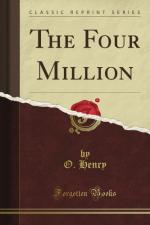“Is that you, Bob?” he asked, doubtfully.
“Is that you, Jimmy Wells?” cried the man in the door.
“Bless my heart!” exclaimed the new arrival, grasping both the other’s hands with his own. “It’s Bob, sure as fate. I was certain I’d find you here if you were still in existence. Well, well, well!—twenty years is a long time. The old restaurant’s gone, Bob; I wish it had lasted, so we could have had another dinner there. How has the West treated you, old man?”
“Bully; it has given me everything I asked it for. You’ve changed lots, Jimmy. I never thought you were so tall by two or three inches.”
“Oh, I grew a bit after I was twenty.”
“Doing well in New York, Jimmy?”
“Moderately. I have a position in one of the city departments. Come on, Bob; we’ll go around to a place I know of, and have a good long talk about old times.”
The two men started up the street, arm in arm. The man from the West, his egotism enlarged by success, was beginning to outline the history of his career. The other, submerged in his overcoat, listened with interest.
At the corner stood a drug store, brilliant with electric lights. When they came into this glare each of them turned simultaneously to gaze upon the other’s face.
The man from the West stopped suddenly and released his arm.
“You’re not Jimmy Wells,” he snapped. “Twenty years is a long time, but not long enough to change a man’s nose from a Roman to a pug.”
“It sometimes changes a good man into a bad one,” said the tall man. “You’ve been under arrest for ten minutes, ‘Silky’ Bob. Chicago thinks you may have dropped over our way and wires us she wants to have a chat with you. Going quietly, are you? That’s sensible. Now, before we go on to the station here’s a note I was asked to hand you. You may read it here at the window. It’s from Patrolman Wells.”
The man from the West unfolded the little piece of paper handed him. His hand was steady when he began to read, but it trembled a little by the time he had finished. The note was rather short.
“Bob: I was at the appointed place on time. When you struck the match to light your cigar I saw it was the face of the man wanted in Chicago. Somehow I couldn’t do it myself, so I went around and got a plain clothes man to do the job. JIMMY.”
LOST ON DRESS PARADE
Mr. Towers chandler was pressing his evening suit in his hall bedroom. One iron was heating on a small gas stove; the other was being pushed vigorously back and forth to make the desirable crease that would be seen later on extending in straight lines from mr. Chandler’s patent leather shoes to the edge of his low-cut vest. So much of the hero’s toilet may be intrusted to our confidence. The remainder may be guessed by those whom genteel poverty has driven to ignoble expedient. Our next view of him shall be as he descends the steps of his lodging-house immaculately and correctly clothed; calm, assured, handsome—in appearance the typical new york young clubman setting out, slightly bored, to inaugurate the pleasures of the evening.




